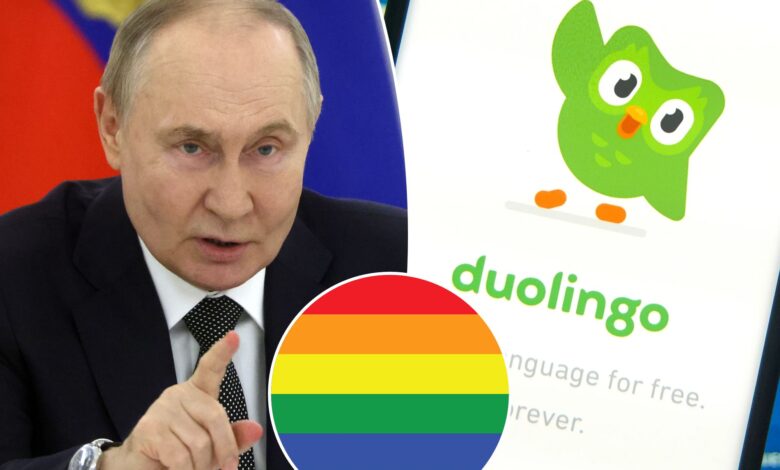Duolingo removes LGBTQ references in Russia after warning

Language learning app Duolingo was forced to remove all LGBTQ references in Russia after being warned by the Kremlin that publishing the content would be considered an act of “extremism.”
Roskomnadzor, Russia’s communications regulator, told the Pittsburgh-based company that it had to censor material promoting “non-traditional sexual relations.” and LGBT propaganda.
Russian strongman Vladimir Putin has sought to portray LGBTQ rights as evidence of moral decay in Western countries.
Last year, he widened restrictions on the promotion of what he calls LGBT propaganda amid a broader crackdown.
“The company Duolingo sent Roskomnadzor a letter in response, in which it confirmed that it had deleted materials promoting non-traditional sexual relations from its training app,” Russian news agencies reported on Tuesday.
A Duolingo spokesperson told The Post on Thursday, “We support LGBTQ+ rights and believe in normalizing LGBTQ+ representation in our content. Unfortunately, local laws prohibit us from including certain content in Russia.”
The rep added that “Duolingo’s mission is to expand access to quality education around the world” and that it was “committed to maintaining access to our product everywhere that is legal to do so.”
Russia has designated the “LGBT movement” as extremist and those supporting it as terrorists, paving the way for serious criminal cases against LGBT people and their advocates.
Russian courts have issued fines for those that violate its “LGBT propaganda” law, including online film distributors and executives.
Since the 2022 invasion of Ukraine, Russia has exercised greater control of what content its citizens can consume on the internet.
The government has throttled access to the Meta-owned encrypted messaging service WhatsApp as well as Telegram.
Russian government officials have also ramped up efforts to stop virtual private networks, or VPNs, which are frequently used by dissidents in authoritarian countries to get around censorship measures and access internet content.
YouTube, the Google-owned video service, remains wildly popular in Russia, making it difficult for the government to institute a crackdown.
Russian courts have fined Google tens of millions of dollars over what the government calls its publishing of “fake” information.
Following the invasion of Ukraine, Russia announced it was banning Facebook and Instagram.
The government has also limited access to Twitter (which has since been rebranded to X), Apple’s App Store, Google’s app store and scores of Western news sites.
The Post has sought comment from the Russian government.
With Post wires




